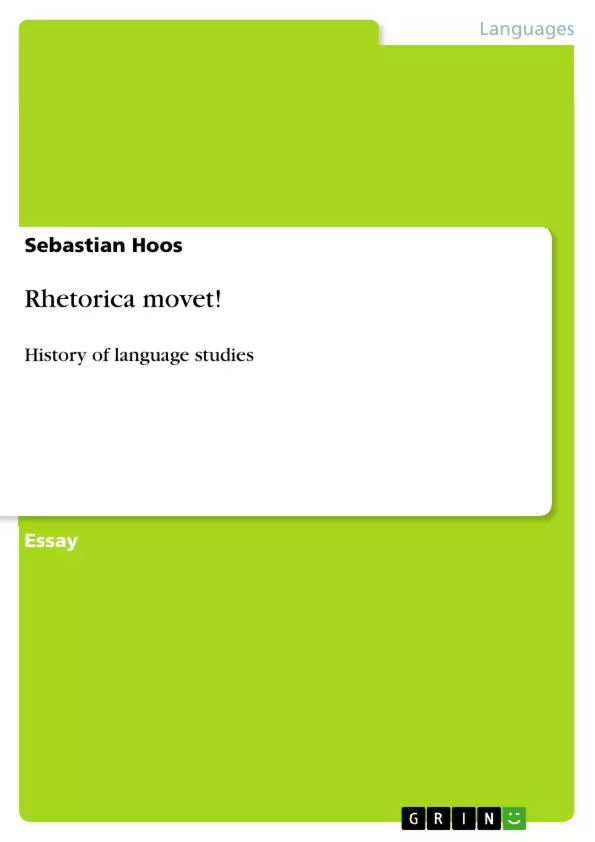This piece is a response paper of the humanities course lectured by Prof. Ferreire Buckley at the University of texas. It intends to highlight the meaning and importance of classical education in the art of rhetorical speaking and thinking for modern democratic societies and individuals.
Inhaltsverzeichnis (Table of Contents)
- Rhetorica movet!
- The abuse of rhetoric
- The rise of rhetoric
- The goal of rhetoric
- Rhetoric in education
- A better understanding of language
- The benefits of increased language studies
- Ethical considerations
- Rhetoric in education – a look back
- The need for rhetoric
Zielsetzung und Themenschwerpunkte (Objectives and Key Themes)
This paper argues for the importance of rhetoric and language studies in modern education. The author contends that rhetoric, often misconstrued as a tool for manipulation, is essential for promoting critical thinking, fostering effective communication, and ensuring the proper functioning of democratic societies. The key themes explored include:- The crucial role of rhetoric in a functioning democracy
- The importance of rhetorical skills in everyday life
- The potential of rhetoric to improve critical thinking and problem-solving
- The ethical considerations inherent in the use of rhetoric
- The significance of rhetoric in shaping individual and collective action
Zusammenfassung der Kapitel (Chapter Summaries)
The paper begins by addressing the negative connotations often associated with rhetoric, arguing that while rhetoric can be misused, it is not inherently a tool for deception. Instead, the author emphasizes the potential of rhetoric to empower individuals with the tools to understand and engage with persuasive arguments. The paper then explores the historical connection between rhetoric and democracy, highlighting the significance of rhetorical skills in promoting civic participation and effective governance. The author argues that contemporary Western democracies neglect the importance of rhetoric in education, leading to a lack of critical thinking and effective communication skills among citizens. The author advocates for a more robust approach to language studies in education, emphasizing the importance of teaching students how to analyze and construct persuasive arguments. The paper argues that rhetoric can foster critical thinking, improve problem-solving abilities, and promote a more ethical approach to communication. The paper concludes by reflecting on the author's own educational experience and highlighting the importance of rhetoric in developing critical thinking and communication skills. The author emphasizes the need for rhetoric to become a fundamental part of early language education, empowering individuals to think and live more effectively.Schlüsselwörter (Keywords)
The core concepts of the paper center around the importance of rhetoric, language studies, critical thinking, democracy, and ethical communication. The author emphasizes the need for a renewed focus on rhetoric in education, arguing that it plays a crucial role in shaping individual and collective action in a democratic society. Key terms include: rhetoric, language studies, critical thinking, democracy, communication, ethics, education, persuasive arguments, civic engagement, and individual and collective action.Frequently Asked Questions
What is the central argument of "Rhetorica movet!"?
The paper argues that rhetoric is essential for modern democratic societies to promote critical thinking, effective communication, and informed civic engagement.
Is rhetoric just a tool for manipulation?
No. While rhetoric can be misused, the author contends it is a vital educational tool that empowers individuals to analyze persuasive arguments and think for themselves.
Why is rhetoric important for democracy?
A functioning democracy relies on citizens who can communicate effectively and evaluate political discourse critically, skills that are at the heart of classical rhetorical training.
How does rhetoric benefit individual problem-solving?
By studying language and argument construction, individuals improve their ability to structure thoughts and find logical solutions to complex issues.
What is the author's recommendation for education?
The author advocates for making rhetoric a fundamental part of language education from an early stage to foster ethical and effective communication.
- Quote paper
- MA Sebastian Hoos (Author), 1994, Rhetorica movet!, Munich, GRIN Verlag, https://www.grin.com/document/144745



